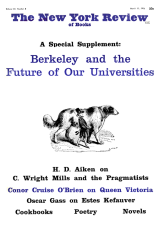In response to:
The Age of Biology from the December 31, 1964 issue
To the Editors:
It was somewhat disturbing to read Stephen Toulmin’s essay “The Age of Biology.” He seemed to imply that because of the tendency for biologists to jump onto the DNA bandwagon huge gaps in biology are going untouched. DNA studies are indeed fashionable and work in that area is certainly intensely competitive. However, Mr. Toulmin must realize that knowledge of the natural order evolves as a series of raggedly linear realizations. What is now known about DNA is likely to lead us towards knowledge in many areas where we are sorely lacking mechanisms of embryonic differentiation, of hormone action, of memory and recall to name a few. These problems all ultimately relate to the ways in which a cell interacts with its environment and prior knowledge of DNA and its interactions is crucial.
Much important work is already progressing along these lines. To cite two prominent examples: A. E. Mirsky and Vincent Alfrey of the Rockefeller Institute have found evidence which implies a mechanism by which DNA can be altered by its environment: the German biologist Cleever has shown that in certain cases the sequential operation of genes depends upon its interaction with the environment.
On another level, one cannot under-estimate the philosophical implications of our knowledge of DNA. DNA is the substance whose structure holds the definition of the human potential but whose expression (realization if you prefer) is intimately dependent upon its biochemical environment the nature of which is no doubt secondarily modified by the more amorphous sociological environment.
Cal Cohn
Cornell University Medical College
Ithaca, N.Y.
This Issue
March 11, 1965



